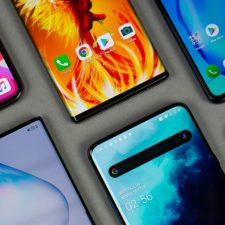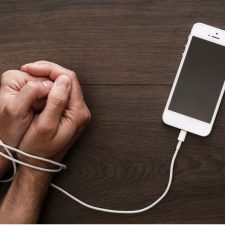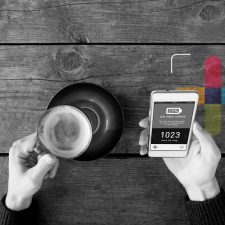NO-MO(BILE) PHONE-PHOBIA
(1) The fear of being out of phone signal range. (2) The anxiety relating to the sudden loss of a cellular connection.
A recent study by scientists from the Eotvos Lorand University in Hungary discovered that people who have their phones taken away from them quickly demonstrated signs of heightened stress when compared to those who were permitted to keep their devices with them.
Those on the trial given another mobile phone also saw their stress levels drop, even though it wasn’t their own handset.
The results from this sample group of 18 to 26 year olds didn’t surprise me and I’m pretty sure that the dependency is not particular to this age group. I’ve seen this same attachment to mobile devices in older users, and a recent survey by Deloitte indicated that one in three UK adults check their phones in the middle of the night, with only half of these in that 18 to 24 bracket. A startling 15 million people also disrupt their sleep patterns, with 32% checking for messages and more than a sixth of them replying!
A total of 60% of those aged between 50-59 now own a smartphone and the number is quickly growing. Among 60-69 year olds that figure sits at 37% and 14% in the over 70s.
So what does this tell us about the state of our society…?
Looking at the stats in more detail turns up some very interesting facts:
66% of the population now suffer from Nomophobia, when just four years ago only 53% of people said they were afraid of losing or being without their phones.
70% of women have mobile phone separation anxiety, compared to 61% of men.
77% of people aged 18-24 are nomophobic, compared to only 68% of people aged 25-34.
66% of people sleep next to their smartphones, and 20% of those polled said they would rather go shoeless for a week than temporarily give up their phones.
47% of men are likely to have two mobile phones, compared to 36% of women.
72% of people report being within five feet of their smartphone most of the time.
In all cases, figures are on the rise and will only continue to grow.
So, are we turning into a technology dependent species, and if so, is there any way back?
Twenty years ago, I knew the phone numbers of all my friends and family from memory. In 2017, I don’t know any. My smartphone has replaced my need to remember numbers and I’m not alone in this.
Yet, this is just the tip of the technology iceberg.
My smartphone is my window to the web, the link to all my communication – from social media to emails, to regular phone calls (yes some of us still use our phones to talk). It is my map, my payment device, my music player, my fitness tracker, my diary, my time keeper, my video player and my camera. It has replaced the need for me to do so many things myself but is this really a good thing and where does it all end?
As we surrender more of our lives into the hands of technology, are we approaching the tipping point that could soon see us unable to function without it?
Or more alarmingly, are we already there…?
DC
Tags: Connectivity, Mobile

 Share On Facebook
Share On Facebook Tweet It
Tweet It


















